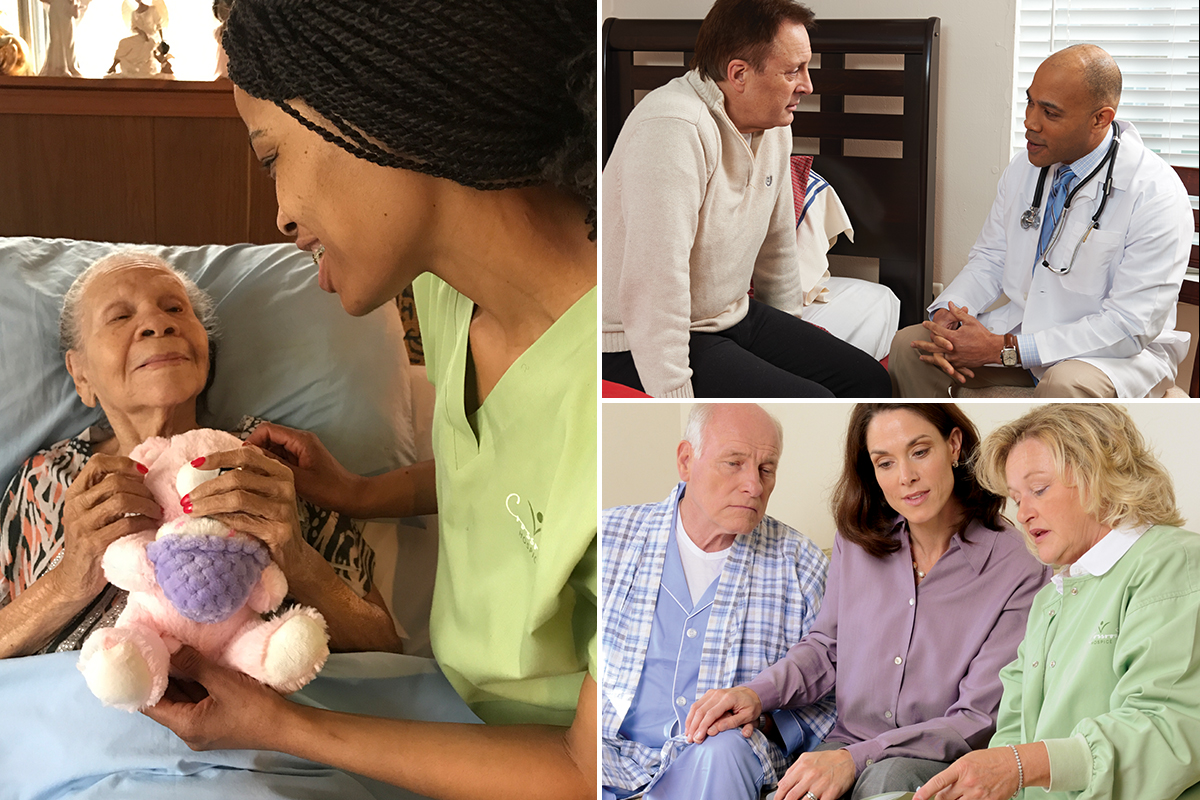A Winning Team: Roles in Hospice

When a loved one reaches the final stages of life, it’s often a very intense and emotional time for family members and friends caring for the patient.
Sometimes, deciding what’s most important or just what to do next can seem overwhelming. That’s why it’s crucial for family caregivers to be aware of the kinds of resources that are available to support them through these difficult days.
The Hospice Team
At Crossroads Hospice & Palliative Care, members of our hospice team play a variety of roles as they work together to ensure patients and their families get the help they need — and also to make certain that the patient’s specific end-of-life goals are understood and abided by.
RN Case Managers
“Our RN case managers are our first line of defense,” explains Sandra Johnson, Executive Director in Crossroads’ Lenexa, KS, regional office. She says the case manager is an RN who develops the patient’s individual plan of care, working with the primary care physician. That individualized care plan serves as the guide managing the kind of care the patient receives as the terminal condition progresses.
“It’s Crossroads’ philosophy that no patients should have to experience uncontrollable pain or symptoms,” says Sandra. “Also, we make every effort to ensure that no patient dies alone.”
Typically, the case manager will see the patient at least twice a week to ensure that the care plan is being implemented satisfactorily and that all the needs of the patient and family members are being addressed.
Home Health Aide
The RN case manager also is responsible for determining whether or not the patient needs the services of a home health aide and for pairing the patient with the aide who is most appropriate for them.
The home health aide generally visits the patient three times a week to ensure all the patient’s personal needs are being met – things like bathing, grooming and linen changes.
“The home health aide are the members of the hospice team who provide that extra bit of tender loving care that help make the patient’s day more enjoyable,” Johnson says. Crossroads aides have experience caring for patients at the end-of-life and are carefully chosen to assist with activities of daily living and personal care.
Social Support
Within the first five days, the patient will be met by members of the hospice team who focus on their individual social and spiritual needs. Typically, a social worker and a chaplain will meet with the patient at least once a month. Their goal is to assist with the patient’s life journey so that it fits with the patient’s individual needs and desire for closure at the end of life.
In addition, bereavement counselors can help the patient and family members cope with issues involving pre-death anxiety as well as post-death feelings of loss. For 13 months following a patient’s death, the bereavement counselors will assist family members and caregivers with understanding their “new normal.” That can mean anything from in-person counseling sessions, phone calls, providing needed written materials, and even sending them cards, as they assist them in adapting to their new life situation.
Volunteers
“Our volunteers are an amazing asset to the Crossroads hospice team,” Sandra says. Naturally, it’s the patient’s choice as to whether or not they want a volunteer to help them. Crossroads volunteers provide comfort, companionship and a helping hand to terminally-ill patients and their families wherever they need it — in their homes, in assisted living facilities and nursing facilities — offering a friendly voice or giving caregivers a much-needed break.
“Volunteers play a vital role by sitting and talking with patients, taking time to learn their interests, socializing with them, letting them reminisce about what they love and what matters to them most,” says Sandra. Often, volunteers will also assist in the creation of Life Journals to help patients recount their lives and experiences in a unique format that their families can enjoy in years to come.
Quality of Life
Like any winning team, a hospice team requires a variety of specialized members playing their individual roles to the best of their abilities — while also working in close coordination with their fellow teammates.
In the case of the hospice team, they “win” when the patient is able to experience the best quality of life possible.
“It’s really a holistic approach that’s designed to ensure that the patient and family members are getting all the care and support they need as that patient’s life journey reaches its completion,” Sandra explains.
“Even though they’re reaching the end of life, they still have the right to enjoy the highest quality of life possible,” she says. “We try to make that possible. It takes a high level of empathy, passion, and compassion, as well as excellent communication skills. The people that are part of our team share that vision and that passion to help patients live their final days with dignity and with as much happiness as possible.”
For more useful hospice information, visit the Crossroads website or give us a call at 1-888-564-3405.
If you found this information helpful, please share it with your network and community.
Copyright © 2017 Crossroads Hospice. All rights reserved.




